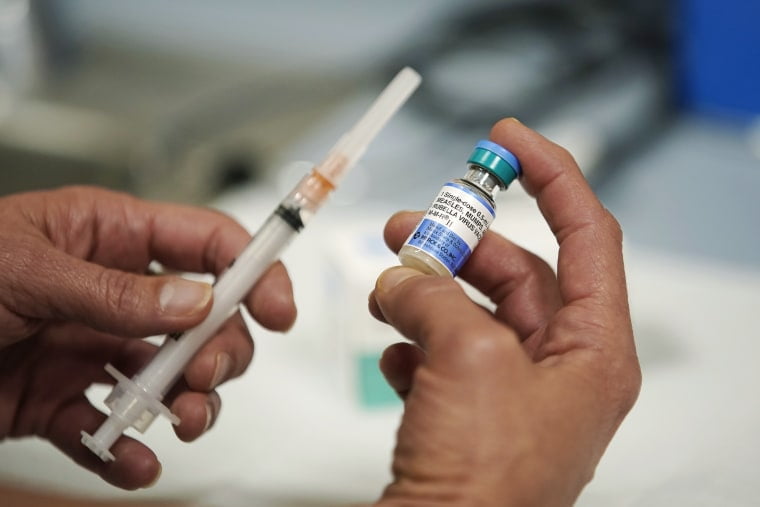Hospitals are on alert in the Philadelphia measles outbreak after a youngster was sent to daycare in defiance of quarantine orders.

Since the measles outbreak began in the Philadelphia region last month, at least eight people have been diagnosed with the disease. On Monday, the latest two cases were verified.
The Children’s Hospital of Philadelphia (CHOP) admitted a kid who had just traveled abroad with an ailment that was later determined to be measles, sparking the outbreak. The case was deemed to be “imported” by the Philadelphia Department of Public Health, although it was not specified where.
The Children’s Hospital of Philadelphia (CHOP) admitted a kid who had just traveled abroad with an ailment that was later determined to be measles, sparking the outbreak. The case was deemed to be “imported” by the Philadelphia Department of Public Health, although it was not specified where.
Three more patients at CHOP, two of whom were already admitted for unrelated reasons, were subsequently infected with the disease.
A parent and child were among the two affected individuals at the hospital. According to the Philadelphia Inquirer, the parent was provided medication that is typically given to unprotected individuals in order to avoid illness after being exposed to measles, but they declined it. The child was not vaccinated.
There, at the Multicultural Education Station daycare center, four additional individuals contracted the virus. According to a daycare employee, the administrator was not available for remark.
According to the health department, none of the individuals who have been diagnosed were immune to measles, which indicates that they were either never vaccinated against measles or had never had the disease before. However, the health department refused to provide information regarding the patients’ ages or status of vaccinations.
In addition to the two patients who were previously hospitalized, the outbreak has resulted in four additional hospital admissions, according to the department.

Additionally, if an infected individual leaves a location, the virus can linger in the air for up to two hours.
“We’ve been on high alert for those who have had a rash, but we are questioning everyone about their exposure to measles patients,” stated Dr. Doug Thompson, chief medical officer of St. Christopher’s Hospital for Children in Philadelphia.
“We’ve been on high alert for those who have had a rash, but we are questioning everyone about their exposure to measles patients,” stated Dr. Doug Thompson, chief medical officer of St. Christopher’s Hospital for Children in Philadelphia.
According to Thompson, the hospital has seen three patients between the ages of one and two who have the measles during the current outbreak. He said, “None had received vaccinations.”
A high fever, cough, runny nose, and red, watery eyes are typical symptoms of measles. Then three to five days later, a red, splotchy rash could appear.
Approximately 1 in 5 individuals who are not vaccinated with the measles are admitted to the hospital, and 1 to 3 out of every 1,000 children who contract the disease pass away from serious complications including brain swelling or pneumonia.
According to Thompson, those who have received vaccinations and are exposed shouldn’t be concerned about becoming ill. The Centers for Disease Control and Prevention state that one dosage is 93% effective in preventing measles and that two doses are 97% effective. Lifelong protection is provided.
By the age of six, 93% of kids in Philadelphia have received all recommended vaccinations against the measles. Kids receive their first dosage between the ages of 12 and 15 months, and their second dose between the ages of 4 and 6.
If given within 72 hours of exposure, a vaccination can still prevent infection in non-immune individuals. An other alternative is an immune globulin injection, which is a prophylactic measure that delivers antibodies. It needs to be administered six days after exposure.
“If somebody was at the hospital sitting in the same room with that patient — in the waiting room, let’s say — and they were deemed at risk, we brought them into our emergency department and we gave them the immune globulin,” he explained.
“If somebody was at the hospital sitting in the same room with that patient — in the waiting room, let’s say — and they were deemed at risk, we brought them into our emergency department and we gave them the immune globulin,” he explained.
Measles was declared eradicated in the United States in 2000, yet sporadic outbreaks still occur, usually originating abroad.
Measles was declared eradicated in the United States in 2000, yet sporadic outbreaks still occur, usually originating abroad.
The CDC reported 85 cases of locally acquired measles in Ohio between October and December of 2022. Four Ohioans had imported measles into the country earlier that year after visiting East Africa, but the CDC was unable to establish a clear connection between those cases and the outbreak.
In 2018 and 2019, there was a significant outbreak in New York as well, which started when unvaccinated visitors returned to the country from Israel. The CDC verified 33 cases in New Jersey and 242 cases in the state, excluding New York City, between October 2018 and April 2019.
The head of Children’s Hospital of Philadelphia’s Vaccine Education Center, Dr. Paul Offit, stated that decreased vaccination rates are probably to blame for the current outbreaks.
“The most infectious disease that can be prevented by vaccination is measles, so when vaccination rates decline, that’s the first illness to resurface,” he stated.
Offit cited several causes that have fueled the tendency, including false information regarding the safety of vaccines, hostility to vaccination laws, and parents’ anxieties about taking their children to the doctor during the Covid pandemic.
Offit cited several causes that have fueled the tendency, including false information regarding the safety of vaccines, hostility to vaccination laws, and parents’ anxieties about taking their children to the doctor during the Covid pandemic.
He added that people don’t appear to realize how contagious measles may be.
